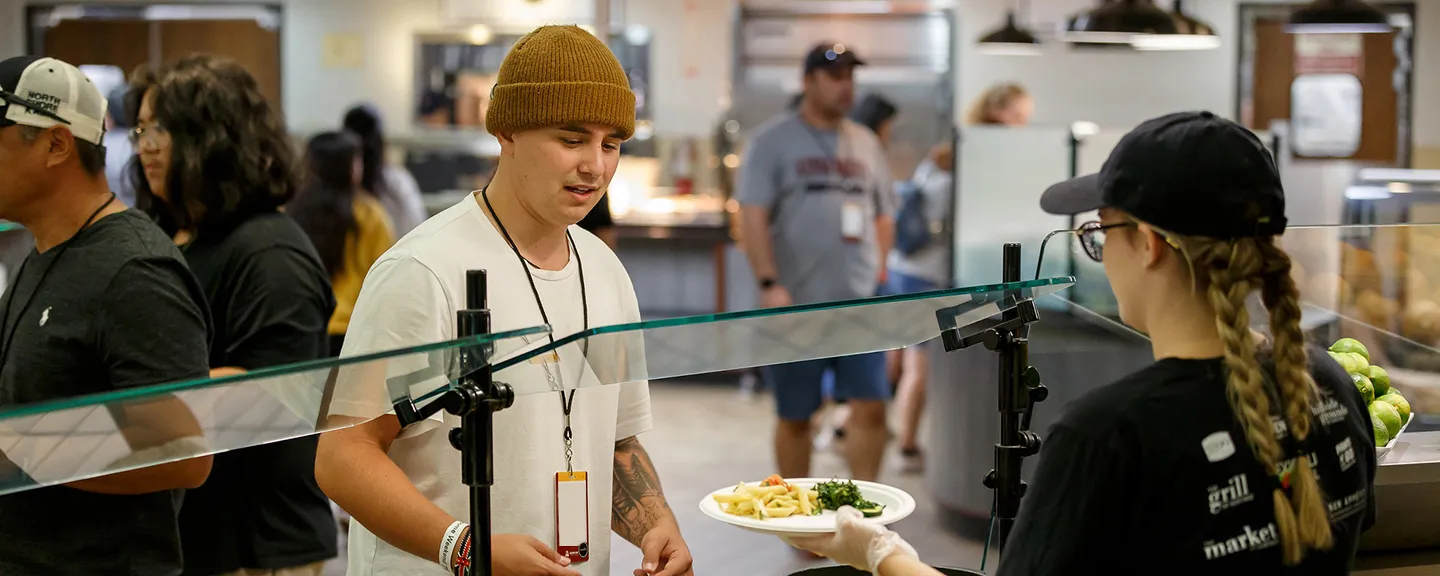- Home
- >
- APU Articles
- >
- News Article
How to Eat Healthy on Campus: 4 Tips for College Students
February 01, 2020 | Written By Ben Kissam

You probably already know a healthy diet is one of the key components for fortifying your immune system—but there are a number of other aspects of staying healthy, like exercising and getting enough sleep. Practicing all of these healthy habits regularly will help you feel better, have more energy, and avoid getting sick during your time on campus.
Here are four tips for eating healthy in college as well as some campus resources you can take advantage of as a student.
1. Eat Wholesome Foods
Eating nutrient-dense foods doesn’t just keep your body healthy; it also makes sticking to your nutrition plan easier. For example, foods that are high in fiber and protein have a satiating effect, meaning you’ll feel full for a longer period of time following meals. Additionally, foods that contain a lot of vitamins and minerals can help prevent you from getting sick.
So if your goal is to stay healthy, try basing your diet around wholesome foods like:
- Fruits and vegetables
- Lean protein sources (if you don’t eat meat, find a plant-based source)
- Healthy fats, like nuts, avocados, and olive oil
- Low-fat dairy products
- Whole grains
It’s also wise to avoid highly processed and sugary foods. You should definitely reward your hard work with a treat every now and then—but it’s best to do so in moderation.
2. Understand How to Eat Healthy at the Dining Hall
Perhaps you’ve heard of the “freshman 15,” or the rumor that new college students gain weight eating at the dining hall.
While these claims may be exaggerated (one study published in the Journal of American College Health found students only gained about 2.7 pounds), it does help to have a plan. After all, portion control can play a big role in weight management.
Following these tips can help you maintain your health while still getting the nutrients your body needs:
- Plan how many meals you’ll eat each day
- Eat a plate of salad before eating other food
- Limit yourself to one dessert or sweet item (per meal or per day)
- Drink plenty of water (hydrating before a meal has been shown to reduce how much you eat)
Today, colleges invest a lot of money to ensure their students stay healthy. For instance, APU’s Dining Services has partnered with the award-winning Bon Appétit Management Company to provide students with delicious, nutritious, and responsibly sourced meals across the school’s campuses. It’s still on students to follow a healthy diet—but this makes it easier for them to consistently make healthy choices by providing access to more wholesome foods.
3. Feed Your Mind and Soul
You might think that eating healthy only pertains to your physical health. But there’s actually a direct link between brain health and good nutrition!
When your diet is full of certain nutrients (like omega-3 fatty acids, vitamin B, and other minerals) your mental health may improve, according to a study published in Clinical Nutrition Research. Likewise, when dealing with stress or anxiety, you’re more likely to binge eat or consume unhealthy foods.
Your mind affects your body, so eating healthy is also an investment in mental health! It’s a good idea to approach your nutrition holistically, or as part of your larger plan to stay healthy on campus.
4. Connect Your Fitness and Health Goals with Your Diet
Working out can improve your mood, give you energy, and strengthen your immune system. It’s also an effective stress-reducer, according to Mayo Clinic, and regulating appetite, Medical News Today explained.
You may be more motivated to exercise consistently if you set a fitness goal (or a New Year’s resolution) that prioritizes your health and connects back to your diet. This gives you things to work toward, such as the number of times you go to the gym each week or the number of healthy meals you eat (this way you can plan “cheat” meals or off-days).
Of course, reaching your personal goals will be easier with access to a cutting-edge gym and wellness professionals. At APU, students can take advantage of the on-campus fitness center before heading to the Dining Hall. In addition, students can enjoy access to an on-campus nutritionist who is able to evaluate their dietary habits and provide support to those with food allergies and eating disorders, among other needs.
As you can see, there are plenty of resources not just for eating healthy but for maximizing your student experience. Curious to learn more about the healthy options and helpful offerings found on Azusa Pacific University’s campuses? Check out our resource directory for more information.